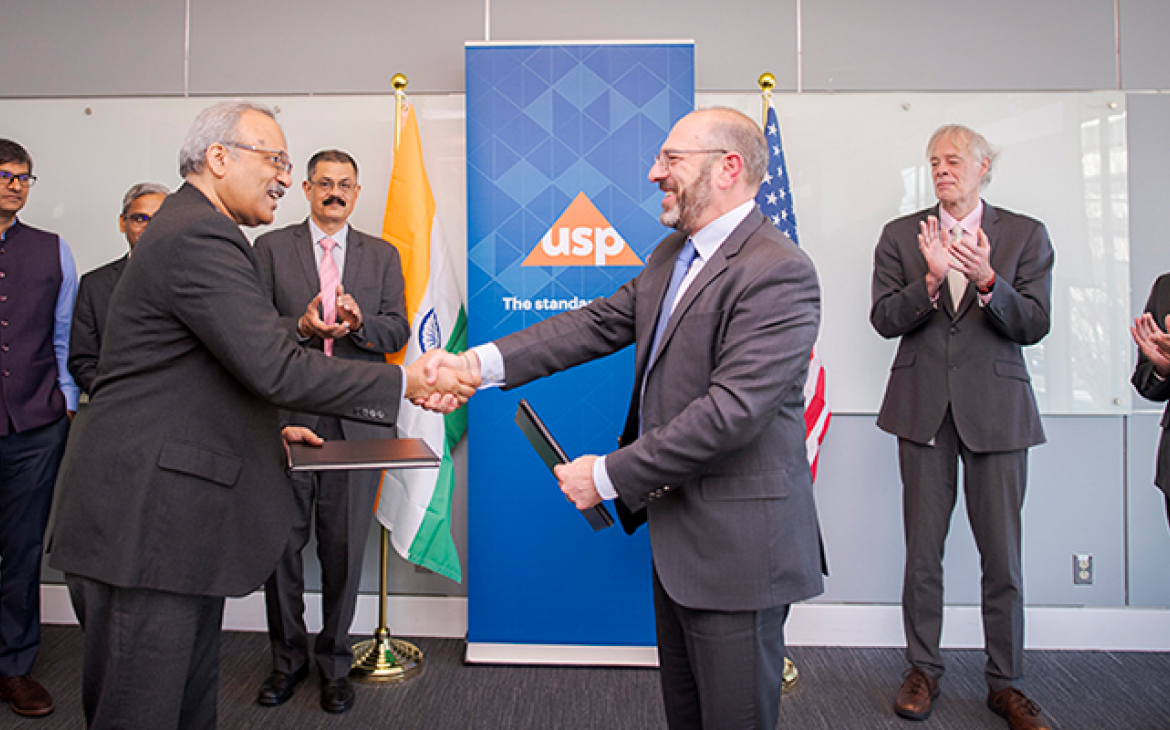
Consistent quality. Greater access. They’re what patients deserve and what USP strives to ensure across the globe through the development of public quality standards.
So, when a new quality paradigm emerges, like Pharmaceutical Continuous Manufacturing (PCM), offering an opportunity for more streamlined, consistent, and efficient production of medicines, USP calls on its most valued resources to help maximize those benefits: USP volunteers from several USP Expert Committees and the USP Quality Standards for Pharmaceutical Continuous Manufacturing (PCM) Expert Panel, a specialized team from academia, industry and regulatory bodies that works to ensure the development and implementation of compendial quality standards for medicines manufactured using PCM.
Convening manufacturing expertise to foster innovation
A significant departure from “batch” production that has been the mainstay of pharmaceutical manufacturing for decades, continuous manufacturing has long been used in other industries to help streamline production, improve quality controls, decrease time to market, and, ultimately, lower costs. With the US Food and Drug Administration (FDA) and other institutions advocating for research and a recently published draft guidance on continuous manufacturing to help pharmaceutical manufacturers transition to continuous manufacturing, USP co-hosted a roundtable discussion in June 2016 with the Center for Structured Organic Particulate Systems (C-SOPS), a leader in PCM research headquartered at Rutgers University. It was here that the need for the USP Expert Panel on PCM was identified to help provide guidance and spot opportunities for standards development in this quickly evolving manufacturing approach.
As noted by Fernando Muzzio, director of C-SOPS and a member of the USP Expert Panel on PCM, “USP is well positioned to serve as a global facilitator in conversations about PCM, given USP’s established relationships with industry leaders and regulatory authorities in countries where this technology could play an essential role in increasing medication quality while lowering costs for patients.”
Volunteer experts lay foundation for PCM quality standards
One of the Expert Panel’s first tasks has been to propose standardized terms and definitions used in the domain of PCM. The panel recently completed the first phase of this effort with the publication of “USP (Pharmacopeial) Perspective for Pharmaceutical Continuous Manufacturing,” a Stimuli article in Pharmacopeial Forum 44(6). The article covers definition of continuous manufacturing, material properties and characterization techniques, process analytical technology (PAT) applications in PCM, risk management and regulatory landscape and consideration.
According to Horacio Pappa, Director, General Chapters at USP – whose team of staff scientists supports the work of the Expert Panel, the article plays a significant role in helping companies transition to PCM and ensuring that the technology evolves to its fullest potential. “The work this group has done will open the door for USP to a new arena. It creates opportunities for us to work on standardization of material properties and their characterization techniques, and processes that may facilitate the implementation of this new technology in the pharmaceutical industry. The article will also help to collect information from stakeholders to identify specific areas that need further standardization and where USP can play an important role in the future.”
Continued collaboration and knowledge sharing will be key to success
USP has continued to engage with PCM stakeholders and thought leaders, hosting the first USP international PCM workshop in India in 2017 to provide an open platform for PCM knowledge sharing and to foster an interactive discussion on key technological and quality challenges and opportunities. USP aims to help establish standards to support manufacturing development to and from PCM, approval, and maintenance, as well as support convergence of standardization efforts from several consortia and professional organizations.
“We believe that in the next decade or two, we will see more and more products being manufactured via PCM. And USP’s role, as we have the unique ability to act as a convener, is to get multiple stakeholders around the table to discuss the challenges” said Jaap Venema, Chief Science Officer & Chair of Council of Experts at USP. It’s an endeavor that wouldn’t be possible without the volunteers on USP’s Expert Panel, who are uniquely positioned to both provide critical knowledge and stimulate the kind of knowledge sharing that will help chart the path forward for PCM.
How you can get involved
As health and science continuously transform, our volunteers help advance how we protect the public's health through standards, advocacy and education. Exploring the various aspects of emerging technologies like PCM and determining their role in quality standards are some of the many opportunities for volunteers at USP. Scientists, academicians, regulatory professionals, healthcare practitioners, and others who work with medicines, dietary supplements and foods are encouraged to apply to our open Call for Candidates.
Learn how you can play a role in creating a healthier tomorrow.


